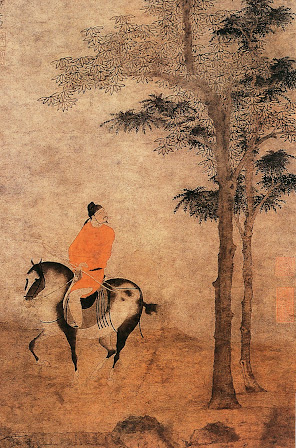by Brett Rutherford
Adapted from Lantingji Xu, “Preface to the Poems Collected from the Orchid Pavilion” by Wang Xizhi (303-361 CE, Jin Dynasty)
In fourth century China, the Jin emperor presided over a picnic of poets in which all sat alongside a gentle stream. Wine cups were placed on large leaves and dropped into the stream. Any time a wine cup came within reach of a poet, he was required to take it up and drink it, and/or write a poem on the spot. My friend Ping Geng obtained for me a ceramic replica of one of the little cups used at this famous poetry gathering. The event yielded an anthology and here is my adaptation of the dedicatory poem. The artwork depicts the poets idling along the stream-bank.
The great Jin rules at the world’s center
(may it always be so), and this late spring,
in the ninth year of the Yonghe Emperor
we have gathered at the Orchid Pavilion,
in the cool north of Kauiji Mountain
for the ritual of purification, as always
the Literati gather, ink-pot and brush
as ready as a bannerman’s weapon.
Mistake not the power of these seated men.
We have climbed the steep hills
to reach this mountain slope. The woods
are dense with shadowing pines.
The slender bamboo is emerging
and the flowing stream has swollen
with the rush of melting snow
into an artificial rivulet that bends
and turns across a levelled field
where we spread out in groups
so that each poet’s arm can reach
to touch the limpid waters
on which a broad leaf boat
carries an oblong wine-cup.
If one such vessel comes your way
you are compelled to take it,
if not, you must write a poem.
If excellent, the emperor applauds;
if not, the waters carry it off.
Although no music wafts
among the pine trees, winds
at work on fervent blossoms
and the sweet harmonies of words
suffice to make us happy. Hearts
rise in a bell-symphony of joy.
The sky is free of clouds.
The air is fresh, no hint of smoke.
The breeze is moderate and cool.
Above us, hidden in blue
a billion stars burn ever on.
Among us all, our poems are few,
Although they number tens
of thousands by now. Our eyes
harvest the landscape for images.
Too quick a lifetime passes
when one is among friends,
not years enough! Not years Enough!
We have each our own way with words,
our chambers and all the things in them.
What one collects, another scorns,
Yet out of such diversity there comes
the pleasures and satisfactions
with which we regale one another.
How quickly, alas, this all may pass’
as we grown old, our young desires
seem weary or over-sated;
What once we trafficked in
seems shallow now. We call
the auctioneer to clear things out.
And trailing ever behind us,
the unacknowledged guest,
is grief, its shadow ever-growing.
Long life, short life,
the better lived, the sooner
it seems to come to calamity.
Alas, the ancients knew best:
The only two ultimate things
are the birth that brought you
And the death that takes you away.
Alas that it must be so! Far back
into the ancient works, the same lament.
It saddens me that the worthy dead
came up with no answer for me.
I cannot express how sad this is.
It is absurd to say that death
makes all life meaningless.
Look! One more leaf has fallen!
Which one? Which one? Oh who can tell?
To live long is surely better
than to have scarcely lived at all,
To read and weep, one hand
unrolling the scroll, the other
outlining the share of each character:
Is this not how one lives
in more than one lifetime
inside the minds of the departed?
And just as we read them,
some future reader
will stumble upon these words
And say, “That poet. I think
I know him. Our minds are one.
I might have been him, he, me.
How many poets are here today?
How many brushes at work,
how many completed verses?
Oh, gather them up? All of them!
Let he who made the rivulet
on which the wine cups float,
to carry gently downward
all of our torments and doubts
Into the far-off river, touched
by swallows and dragonflies,
into the great sea of eternity.










